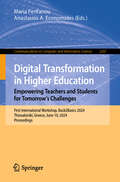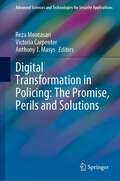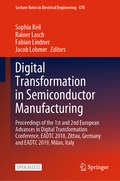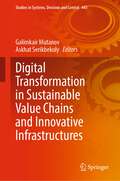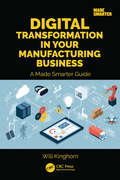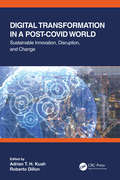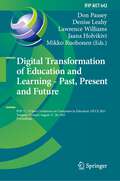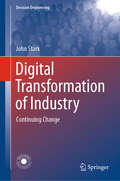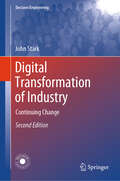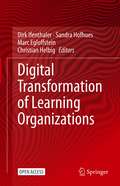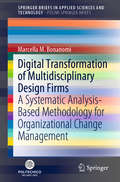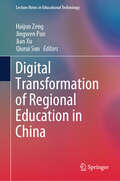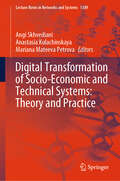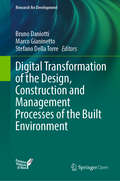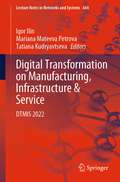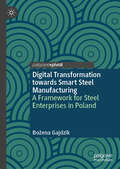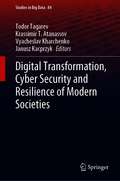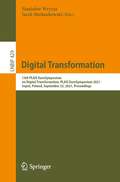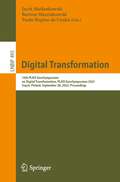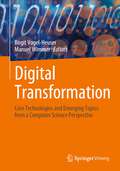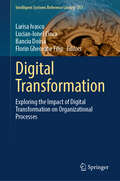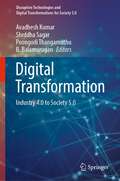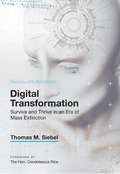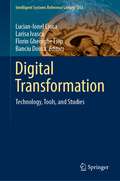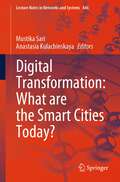- Table View
- List View
Digital Transformation in Higher Education. Empowering Teachers and Students for Tomorrow’s Challenges: First International Workshop, Back2Basics 2024, Thessaloniki, Greece, June 10, 2024, Proceedings (Communications in Computer and Information Science #2247)
by Maria Perifanou Anastasios A. EconomidesThis book constitutes the refereed proceedings of the First International Workshop on Digital Transformation in Higher Education. Empowering Teachers and Students for Tomorrow’s Challenges, Back2Basics 2024, held in Thessaloniki, Greece, on June 10, 2024. This workshop was part of the 20th International Conference on Intelligent Tutoring Systems (ITS 2024), which took place in Thessaloniki on June 10–13, 2024. The 06 full papers here were thoroughly reviewed and selected from a total of 09 submissions. This interdisciplinary event brought together researchers and educators from various European higher education institutions to address the challenges and opportunities of digital transformation in higher education (HE).
Digital Transformation in Policing: The Promise, Perils and Solutions (Advanced Sciences and Technologies for Security Applications)
by Anthony J. Masys Reza Montasari Victoria CarpenterThis book shares essential insights into how the social sciences and technology could foster new advances in managing the complexity inherent to the criminal and digital policing landscape. Said landscape is both dynamic and intricate, emanating as it does from crimes that are both persistent and transnational. Globalization, human and drug trafficking, cybercrime, terrorism, and other forms of transnational crime can have significant impacts on societies around the world. This necessitates a reassessment of what crime, national security and policing mean. Recent global events such as human and drug trafficking, the COVID-19 pandemic, violent protests, cyber threats and terrorist activities underscore the vulnerabilities of our current security and digital policing posture.This book presents concepts, theories and digital policing applications, offering a comprehensive analysis of current and emerging trends in digital policing. Pursuing an evidence-based approach, it offers an extraordinarily perceptive and detailed view of issues and solutions regarding the crime and digital policing landscape. To this end, it highlights current technological and methodological solutions as well as advances concerning integrated computational and analytical solutions deployed in digital policing. It also provides a comprehensive analysis of the technical, ethical, legal, privacy and civil liberty challenges stemming from the aforementioned advances in the field of digital policing; and accordingly, offers detailed recommendations supporting the design and implementation of best practices including technical, ethical and legal approaches when conducting digital policing. The research gathered here fits well into the larger body of work on various aspects of AI, cybersecurity, national security, digital forensics, cyberterrorism, ethics, human rights, cybercrime and law. It provides a valuable reference for law enforcement, policymakers, cybersecurity experts, digital forensic practitioners, researchers, graduates and advanced undergraduates, and other stakeholders with an interest in counter-terrorism. In addition to this target audience, it offers a valuable tool for lawyers, criminologist and technology enthusiasts.
Digital Transformation in Semiconductor Manufacturing: Proceedings of the 1st and 2nd European Advances in Digital Transformation Conference, EADTC 2018, Zittau, Germany and EADTC 2019, Milan, Italy (Lecture Notes in Electrical Engineering #670)
by Rainer Lasch Sophia Keil Fabian Lindner Jacob LohmerThis open access book reports on cutting-edge electrical engineering and microelectronics solutions to foster and support digitalization in the semiconductor industry. Based on the outcomes of the European project iDev40, which were presented at the two first conference editions of the European Advances in Digital Transformation Conference (EADCT 2018 and EADTC 2019), the book covers different, multidisciplinary aspects related to digital transformation, including technological and industrial developments, as well as human factors research and applications. Topics include modeling and simulation methods in semiconductor operations, supply chain management issues, employee training methods and workplaces optimization, as well as smart software and hardware solutions for semiconductor manufacturing. By highlighting industrially relevant developments and discussing open issues related to digital transformation, the book offers a timely, practice-oriented guide to graduate students, researchers and professionals interested in the digital transformation of manufacturing domains and work environments.
Digital Transformation in Sustainable Value Chains and Innovative Infrastructures (Studies in Systems, Decision and Control #443)
by Galimkair Mutanov Askhat SerikbekulyThis book includes 15 works by scientists of the Eurasian region, which reveal the various stages of the life cycle of digital transformation The creation of value propositions and their distribution chains is important for the sustainable development of society.This view of sustainable value chains on the part of public administration and business, considering modern scientific research, reveals the problems of education and science in the formation of chains sustainability and their infrastructure.Modern views on the actual problems of the digital service in the creation of value propositions with the participation of development institutions, new educational technologies, and state regulation both at the level of the world community and at the level of individual countries are revealed.The problems of digital transformation of economic actors and industries at different stages of the chain of value creation from a position of sustainable development, innovation in the infrastructure of public administration markets are considered.This book is useful to the academic community and a new generation of infrastructure creators to identify vectors to support the innovative development of value chains.
Digital Transformation in Your Manufacturing Business: A Made Smarter Guide
by Will KinghornAre you a manufacturing leader and unsure of which technology can help grow your business? Have you heard about 3D printing, Industry 4.0, robots, or artificial intelligence but don’t know how they can be used in manufacturing?This book gives a clear and practical guide to manufacturing technologies, providing examples of how they’re used, as well as the tools and techniques you’ll need to get started. Each technology is covered in a brief and simple way allowing you to understand it quickly and decide if it’s worth investigating for your business.In addition to this book, the online resources will provide you with templates and examples to help you get started. At every stage there are suggestions for the key terms you will need to find more information appropriate to your industry.This isn’t just about technology, it’s a roadmap for your digital transformation. Start with guidance on setting your company’s vision and direction, to getting the people in your business engaged and ready to adopt technology. Move on to exploring each of the technologies, and the tools and techniques you’ll find useful along the way. Finally, connect the technologies with the tools that are appropriate, and look at common issues in manufacturing businesses and how these can be resolved.Get started with making informed decisions, embracing technologies, and transforming your business.
Digital Transformation in a Post-Covid World: Sustainable Innovation, Disruption, and Change
by Roberto Dillon Adrian T. H. KuahThis book explores the innovations, disruptions and changes that are required to adapt in a fast-evolving landscape due to the extraordinary circumstances triggered by the COVID-19 pandemic. Recognized experts from around the world share their research and professional experience on how the working environment, as well as the world around them, have changed due to the pandemic. Chapters consider how different fields across technology and business have been affected by this new, dramatic scenario and the drastic consequences that the pandemic had on them. With diverse contributions stemming from public health, technology strategies, urban planning and sociology to sustainable management, this volume is articulated into four distinct but complementary sections of People, Process, Planet, and Prosperity influencing the post-COVID world. This book will be of great interest to those in the fields of computer science and information technology, as well as those studying the impact and effects that COVID-19 is having on society.
Digital Transformation of Education and Learning - Past, Present and Future: IFIP TC 3 Open Conference on Computers in Education, OCCE 2021, Tampere, Finland, August 17–20, 2021, Proceedings (IFIP Advances in Information and Communication Technology #642)
by Don Passey Mikko Ruohonen Lawrence Williams Denise Leahy Jaana HolvikiviThis book constitutes the refereed post-conference proceedings of the IFIP TC 3 Open Conference on Computers in Education, OCCE 2021, held in Tampere, Finland, in August 2021. The 22 full papers and 2 short papers included in this volume were carefully reviewed and selected from 44 submissions. The papers discuss key emerging topics and evolving practices in the area of educational computing research. They are organized in the following topical sections: Digital education across educational institutions; National policies and plans for digital competence; Learning with digital technologies; and Management issues.
Digital Transformation of Industry: Continuing Change (Decision Engineering)
by John StarkThis graduate textbook is focused on digital transformation. It answers key questions regarding: which technologies can be used to transform an organisation, which activities within an organisation can be transformed, and what the aim of digital transformation should be.The content is divided into three main parts, the first of which offers an introduction to the topic, highlights fundamental examples of digital transformation, defines the terminology, and enables readers to quickly understand the main components of digital transformation. The second part of the book addresses examples of digital transformation from several industries, including:government; finance; health; manufacturing; and education. The third and final section of the book describes the activities and processes within a typical digital transformation programme. The pedagogical approach to the process makes the book beneficial to both students who have never been involved in such a programme and practitioners who plan to implement digital transformation in their organisation.
Digital Transformation of Industry: Continuing Change (Decision Engineering)
by John StarkThis graduate textbook is focused on digital transformation. It answers key questions regarding: which technologies can be used to transform an organisation, which activities within an organisation can be transformed, and what the aim of digital transformation should be. Now fully updated and expanded in this second edition, the content is divided into three main parts, the first of which offers an introduction to the topic, highlights fundamental examples of digital transformation, defines the terminology, and enables readers to quickly understand the main components of digital transformation. The second part of the book addresses examples of digital transformation from several industries, including: government; finance; health; manufacturing; and education. The third and final section of the book describes the activities and processes within a typical digital transformation programme. The pedagogical approach to the process makes the book beneficial to both students who have never been involved in such a programme and practitioners who plan to implement digital transformation in their organisation.
Digital Transformation of Learning Organizations
by Dirk Ifenthaler Sandra Hofhues Marc Egloffstein Christian HelbigThis open access volume provides insight into how organizations change through the adoption of digital technologies. Opportunities and challenges for individuals as well as the organization are addressed. It features four major themes: 1. Current research exploring the theoretical underpinnings of digital transformation of organizations. 2. Insights into available digital technologies as well as organizational requirements for technology adoption. 3. Issues and challenges for designing and implementing digital transformation in learning organizations. 4. Case studies, empirical research findings, and examples from organizations which successfully adopted digital workplace learning.
Digital Transformation of Multidisciplinary Design Firms: A Systematic Analysis-Based Methodology for Organizational Change Management (SpringerBriefs in Applied Sciences and Technology)
by Marcella M. BonanomiThis book analyzes the process-oriented and organizational changes related to the digital transformation of multidisciplinary design firms. Based on this it proposes a systematic analysis-based methodology for change management, which consists of two distinct, but complementary components: a framework and a set of analysis methods. It particularly focuses on the relationship between the new paradigms, perspectives, and context of change related to digital transformation. The proposed framework combines these three elements in order to identify and address areas of investigation concerning process-oriented and organizational changes in the context of digital transformation, and also quantitatively and qualitatively assesses these changes in practice. This book offers the first comprehensive review of change management and digital practice, and includes case studies to enhance readers’ understanding of change management in the context of the digitalization. As such it is of interest to both industry practitioners and researchers.
Digital Transformation of Regional Education in China (Lecture Notes in Educational Technology)
by Jian Xu Haijun Zeng Jingwen Pan Qiurui SunThis book presents the best practices of smart education in different regions across China. Each chapter addresses one or more of the following topics: smart learning environments, new education and teaching models, teaching platforms and digital tool applications, teacher professional development, smart education evaluation, education governance, and education digitization. This edited collection promotes digital integration and innovative development of education, improves regional education levels, and ultimately forms a new model to support and lead the modernization of education in China.
Digital Transformation of Socio-Economic and Technical Systems: Theory and Practice (Lecture Notes in Networks and Systems #1309)
by Angi Skhvediani Mariana Mateeva Petrova Anastasia KulachinskayaIn the theoretical field, this book presents innovative concepts and models that elucidate the dynamics and implications of digitalization across diverse socio-economic systems. Additionally, from a practical perspective, the book offers real-world examples and case studies that illustrate successful strategies for implementing digital technologies and their contributions to the sustainable development of various industries. In recent years, digital economy has become a key driver, which fosters growth of various systems. The COVID-19 pandemic has additionally boosted this process and resulted in higher effectiveness of both formal and informal institutes, structural changes on labour market, new opportunities for social mobility, new markets, new forms of interaction between government, individuals, and enterprises. On the other hand, these processes entailed significant challenges among which are digital divide, cyber security, high costs of process digitalization, etc. This book is designed for researchers, educators, students, and practitioners interested in acquiring profound insights into the contemporary processes of digital transformation and their impact on socio-economic and technical systems.
Digital Transformation of the Design, Construction and Management Processes of the Built Environment (Research for Development)
by Bruno Daniotti Stefano Della Torre Marco GianinettoThis open access book focuses on the development of methods, interoperable and integrated ICT tools, and survey techniques for optimal management of the building process. The construction sector is facing an increasing demand for major innovations in terms of digital dematerialization and technologies such as the Internet of Things, big data, advanced manufacturing, robotics, 3D printing, blockchain technologies and artificial intelligence. The demand for simplification and transparency in information management and for the rationalization and optimization of very fragmented and splintered processes is a key driver for digitization. The book describes the contribution of the ABC Department of the Polytechnic University of Milan (Politecnico di Milano) to R&D activities regarding methods and ICT tools for the interoperable management of the different phases of the building process, including design, construction, and management. Informative case studies complement the theoretical discussion. The book will be of interest to all stakeholders in the building process – owners, designers, constructors, and faculty managers – as well as the research sector.
Digital Transformation on Manufacturing, Infrastructure & Service: DTMIS 2022 (Lecture Notes in Networks and Systems #684)
by Tatiana Kudryavtseva Igor Ilin Mariana Mateeva PetrovaThis book contains theoretical, econometric, experimental, and policy-oriented contributions of the DTMIS conference participants. Every year the DTMIS conference brings together experts from academia and industry to uncover the challenges and solutions to ensuring digital transformation on manufacturing, infrastructure, and service. The DTMIS proceedings is distinguished by the fact that it contains works not only by scientists, but also by practitioners in the industry, and, of course, their collaboration works are of particular and undeniable value.This book is useful for experienced scientists and practitioners who seek to find something new for themselves and apply it in their work, as well as for students at the beginning of their scientific activity.
Digital Transformation towards Smart Steel Manufacturing: A Framework for Steel Enterprises in Poland
by Bożena GajdzikThis book presents the impact of digital transformation and other megatrends on the steel industry, focusing on the digitization of processes, and the automation and robotization of operations in steel companies. Technological innovations in the steel industry are presented, as well as the changes taking place within the supply chains An essential part of the book is the results of direct research, which deal with the transformation of enterprises to smart steel manufacturing. The research was done on the Polish steel market, which is an open market with foreign capital. Exploring a sample of representatives of steel companies that serve both domestic and foreign markets, this book discusses the implementation of the pillars of Industry 4.0 as well as the strategic transformation of the steel industry.
Digital Transformation, Cyber Security and Resilience of Modern Societies (Studies in Big Data #84)
by Krassimir T. Atanassov Janusz Kacprzyk Vyacheslav Kharchenko Todor TagarevThis book presents the implementation of novel concepts and solutions, which allows to enhance the cyber security of administrative and industrial systems and the resilience of economies and societies to cyber and hybrid threats. This goal can be achieved by rigorous information sharing, enhanced situational awareness, advanced protection of industrial processes and critical infrastructures, and proper account of the human factor, as well as by adequate methods and tools for analysis of big data, including data from social networks, to find best ways to counter hybrid influence. The implementation of these methods and tools is examined here as part of the process of digital transformation through incorporation of advanced information technologies, knowledge management, training and testing environments, and organizational networking. The book is of benefit to practitioners and researchers in the field of cyber security and protection against hybrid threats, as well as to policymakers and senior managers with responsibilities in information and knowledge management, security policies, and human resource management and training.
Digital Transformation: 13th PLAIS EuroSymposium on Digital Transformation, PLAIS EuroSymposium 2021, Sopot, Poland, September 23, 2021, Proceedings (Lecture Notes in Business Information Processing #429)
by Stanisław Wrycza Jacek MaślankowskiThis book constitutes the refereed proceedings of the 13th PLAIS EuroSymposium 2021 which was held in Sopot, Poland, on September 23, 2021. The objective of the PLAIS EuroSymposium 2021 is to promote and develop high quality research on all issues related to digital transformation. It provides a forum for IS researchers and practitioners in Europe and beyond to interact, collaborate, and develop this field. The 10 papers presented in this volume were carefully reviewed and selected from 34 submissions. They were organized in topical sections named: digital enterprises; smart cities; digital education; and innovative methods in data and process analysis.
Digital Transformation: 15th PLAIS EuroSymposium on Digital Transformation, PLAIS EuroSymposium 2023, Sopot, Poland, September 28, 2023, Proceedings (Lecture Notes in Business Information Processing #495)
by Paulo Rupino da Cunha Jacek Maślankowski Bartosz MarcinkowskiThis book constitutes the proceedings of the 15th PLAIS EuroSymposium on Digital Transformation, PLAIS EuroSymposium 2023, which took place in Sopot, Poland, in September 2023. The primary objective of the PLAIS EuroSymposium 2023 was to foster discussions on general issues pertaining to digital transformation and related topics. The papers selected this year are related to the use of machine learning, internet of things and social media. The 7 full papers included in this volume were carefully reviewed and selected from a total of 22 submissions.
Digital Transformation: Core Technologies and Emerging Topics from a Computer Science Perspective
by Manuel Wimmer Birgit Vogel-HeuserDigital Transformation in Industry 4.0/5.0 requires the effective and efficient application of digitalization technologies in the area of production systems. This book elaborates on concepts, techniques, and technologies from computer science in the context of Industry 4.0/5.0 and demonstrates their possible applications. Thus, the book serves as an orientation but also as a reference work for experts in the field of Industry 4.0/5.0 to successfully advance digitization in their companies.
Digital Transformation: Exploring the Impact of Digital Transformation on Organizational Processes (Intelligent Systems Reference Library #257)
by Florin Gheorghe Filip Larisa Ivascu Lucian-Ionel Cioca Banciu DoinaThe book offers aspects related to the health and process safety field, complex approaches to artificial intelligence, the role of accounting and auditing in the digital age, DT in agriculture, artificial intelligence in the maritime domain, education, management, sustainability and mobile technologies in learning. Digitization, digitalization and digital transformation (DT) are important for public organizations and private organizations. Despite their importance, these steps are approached differently in organizations. Public organizations emphasize the importance of digital transformation, while public organizations make efforts to align themselves with citizens' demands from a digitalization perspective. Incorporating technologies into organizational processes has become a priority for all industries to lead to important changes. All these activities are covered by the digital transformation that can lead to increased efficiency, agility, innovation and the unlocking of organizational values. Through this complex approach, the book contributes to the completion of knowledge in the field of digital transformation, develops and anticipates new research directions. It is addressed to professionals, practitioners, researchers, students and other interested parties.
Digital Transformation: Industry 4.0 to Society 5.0 (Disruptive Technologies and Digital Transformations for Society 5.0)
by B. Balamurugan Avadhesh Kumar Shrddha Sagar Poongodi ThangamuthuThis book focuses on computing for Industry 4.0 illustrating different domains with the purpose of integration with existing domains for automation of processes. It gives readers an idea about the various challenges and design structure for computing of Industry 4.0. The contents include contributions from experts in Cyber-Physical Systems (CPS), the Internet of Things (IoT), Industrial Internet of Things (IIoT), cloud computing, cognitive computing, and artificial intelligence across the world, contributing their knowledge to identify the different characteristics of the above domains.
Digital Transformation: Survive and Thrive in an Era of Mass Extinction
by Thomas Siebel<p>From visionary Silicon Valley entrepreneur Tom Siebel comes a penetrating examination of the new technologies that are disrupting business and government—and how organizations can harness them to transform into digital enterprises. <p>The confluence of four technologies—elastic cloud computing, big data, artificial intelligence, and the internet of things —writes Siebel, is fundamentally changing how business and government will operate in the 21st century. <p>Siebel masterfully guides readers through a fascinating discussion of the game-changing technologies driving digital transformation and provides a roadmap to seize them as a strategic opportunity. He shows how leading enterprises such as Enel, 3M, Royal Dutch Shell, the U.S. Department of Defense, and others are applying AI and IoT with stunning results. <p>Digital Transformation is the guidebook every business and government leader needs to survive and thrive in the new digital age.</p>
Digital Transformation: Technology, Tools, and Studies (Intelligent Systems Reference Library #253)
by Florin Gheorghe Filip Larisa Ivascu Lucian-Ionel Cioca Banciu DoinaThis book presents a multidisciplinary approach to digital transformation process of organizational transformation, offering support throughout the implementation process to all those interested. The digital transformation (DT) is a priority for many companies in the context of technological evolution. The use of appropriate tools, methodologies, methods, approaches, and techniques for DT, depending on the organizational characteristics, can contribute to a complete approach to organizational processes and to their efficiency. Digital transformation involves the adoption and use of new digital technologies to develop new products and services, modify existing ones and develop new business models to increase efficiency, productivity, and competitiveness. Starting from marketing to culture and education to health, automotive, engineering, mobility and human resources and others, it is addressed to professionals, practitioners, researchers, students, and other interested parties.
Digital Transformation: What are the Smart Cities Today? (Lecture Notes in Networks and Systems #846)
by Anastasia Kulachinskaya Mustika SariThis book presents various models and approaches, specific proposals, and recommendations on a whole range of areas for smart cities' development. This book proposes to look at the problem through a broad overview of all elements of a smart city as a single system: smart governance, smart buildings, smart transportation, smart tourism destinations, smart economy, and smart environment. The book is intended for both young and experienced scientists who want to get acquainted with the latest trends and data for using them in their research.
